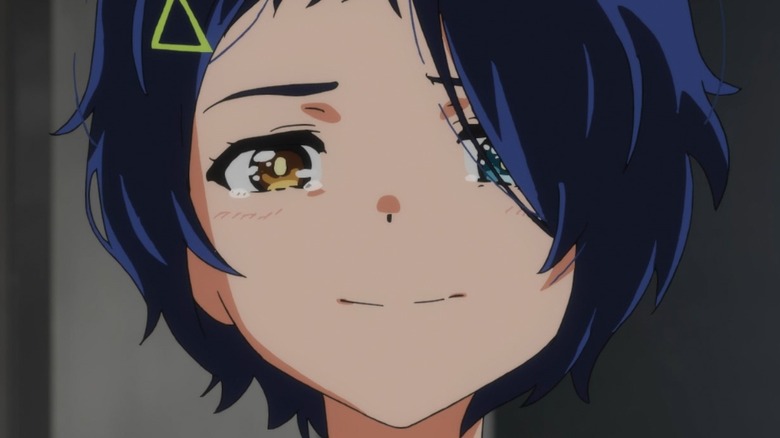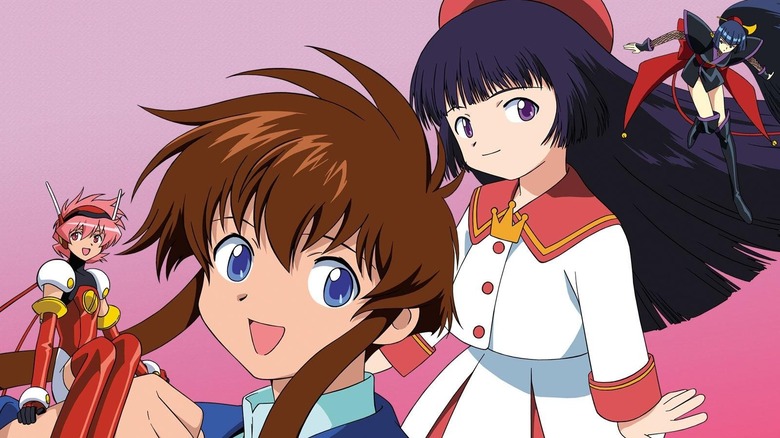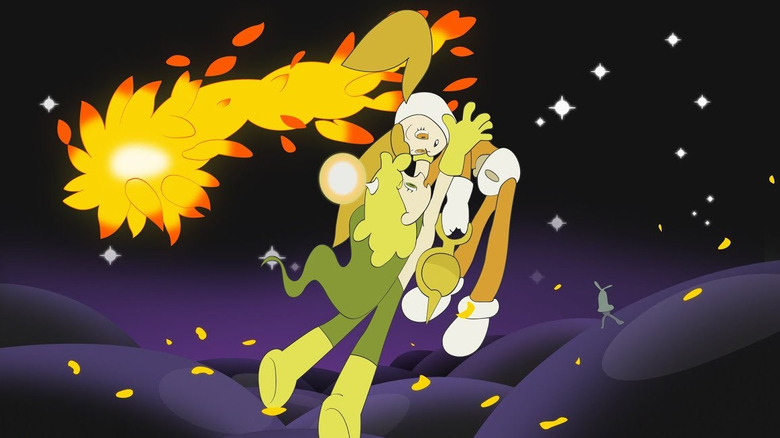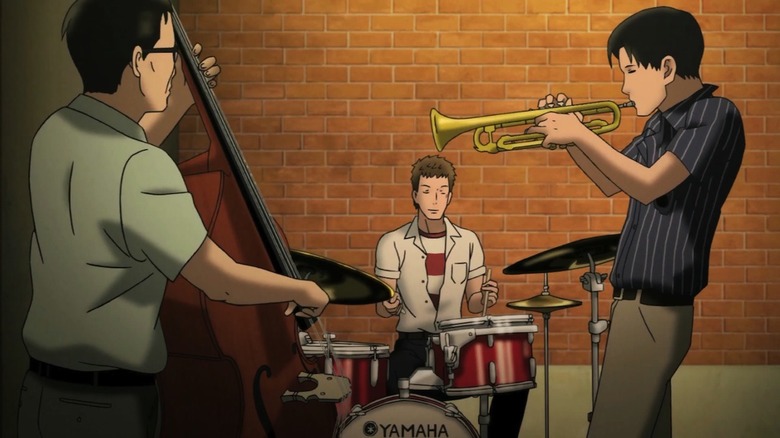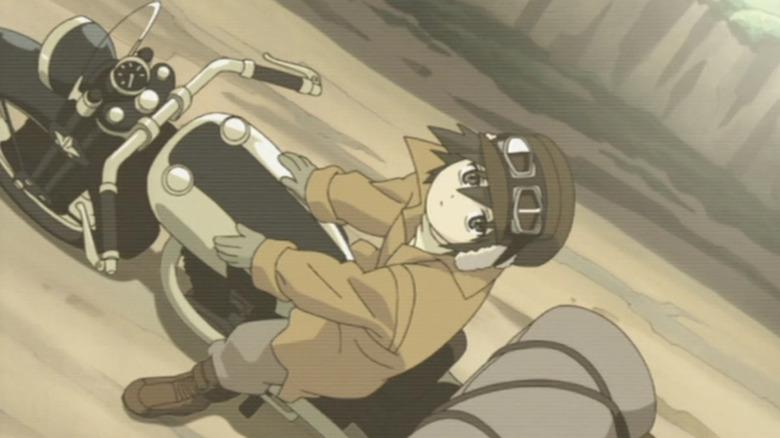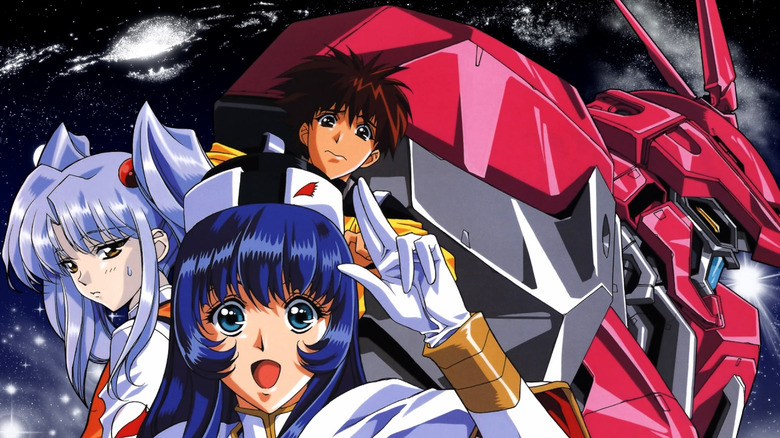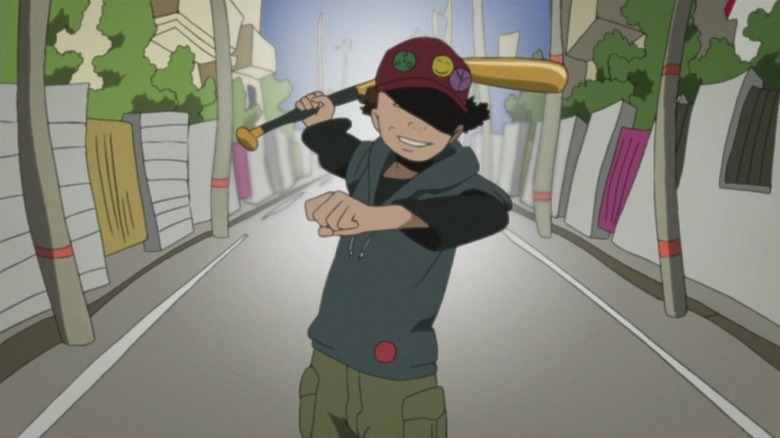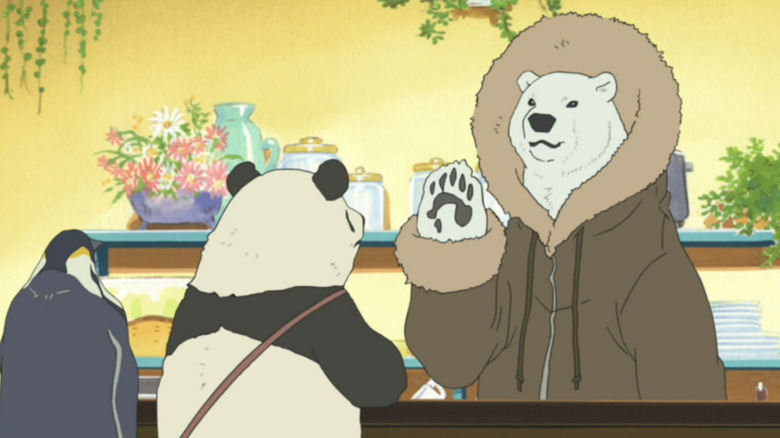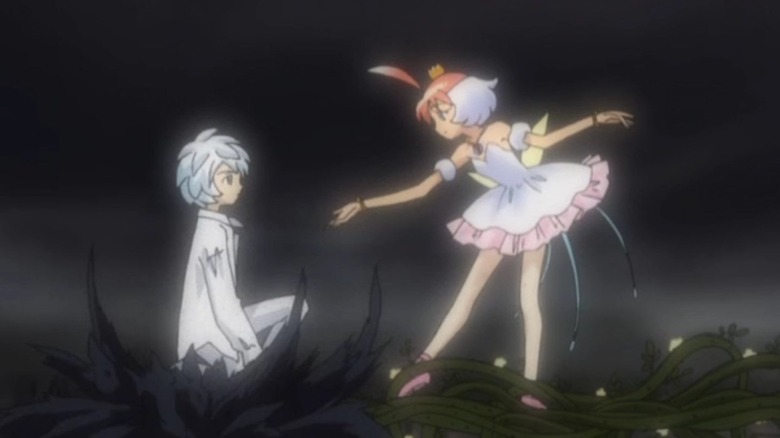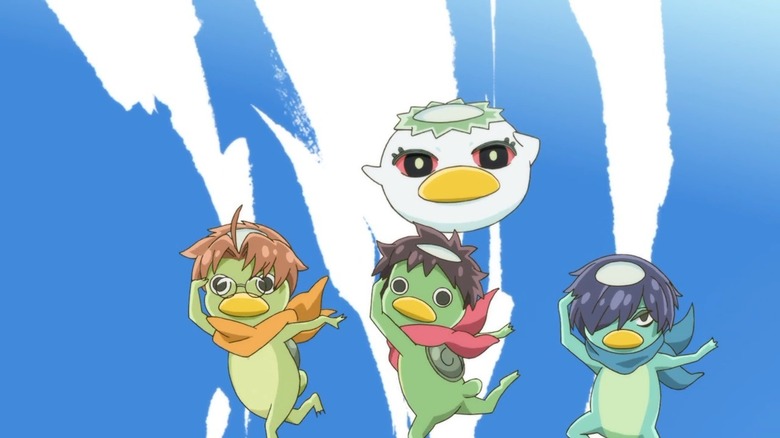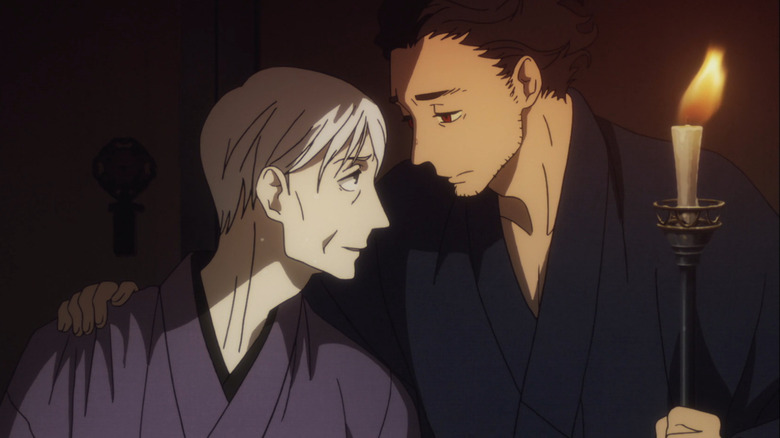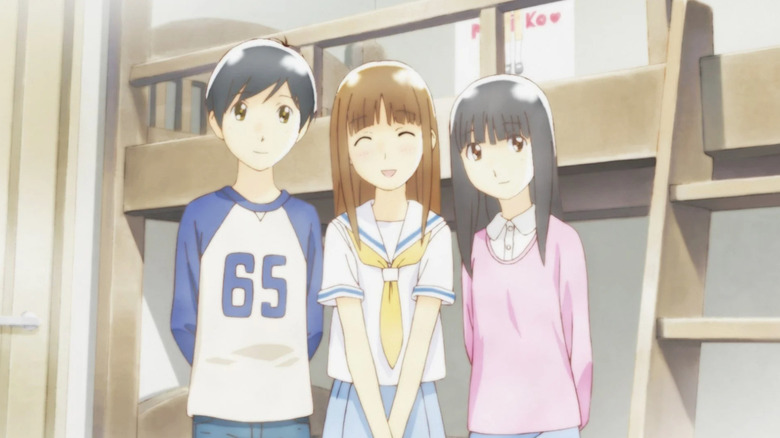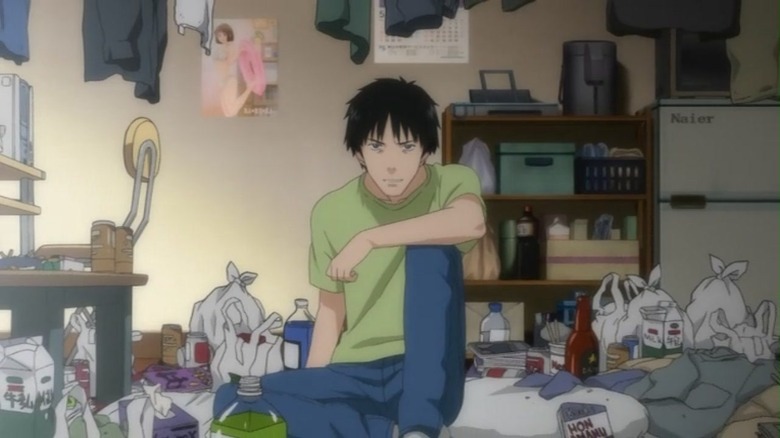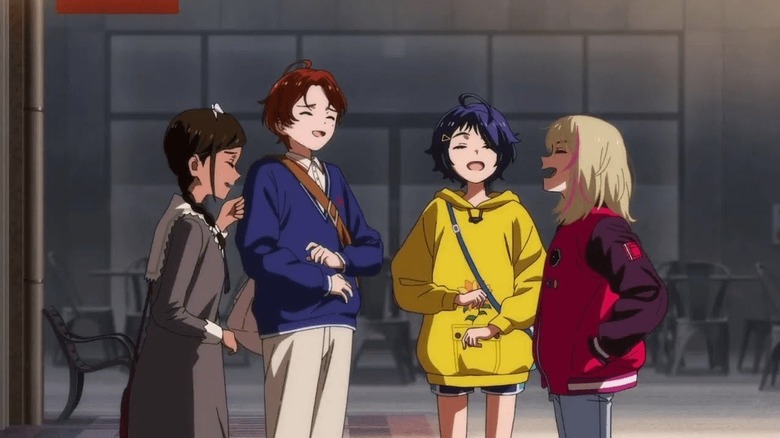Underrated Anime Shows You Need To Watch
There's more anime being made in Japan and available to stream worldwide now than there has ever been before. Given how much sheer content there is to sift through out there, it makes sense that many great anime will end up being passed over. Perhaps these overlooked series suffered from poor marketing or unfortunate release plans. Perhaps they had some success as flavor-of-the-month shows but fell out of the discourse later on. Perhaps they were simply too off the beaten path to ever become a major success in the first place.
Regardless of the reasons why the following anime shows ended up in a place where they could be considered underrated, they're all good anime that are absolutely worth your time. The shows on this list range from wacky comedies to dark psychological dramas and mecha — whatever your taste in anime, you're sure to find something you'll enjoy here.
Angelic Layer
The all-female manga collective CLAMP has authored several fan-favorite manga which have been adapted into multiple hit anime series, from "Cardcaptor Sakura" to "xxxHolic." "Angelic Layer," CLAMP's go at the battle shonen genre, is one of their more obscure properties, but the 2001 anime adaptation is both as cute as it appears and more emotionally involving than it may seem at first glance.
Centered around a competition between fighting robot dolls, "Angelic Layer" can feel a bit like a "Pokemon" or "Yu-Gi-Oh" kind of show at times, a tie-in to a brand of toys that don't actually exist. But the formula is elevated by high-quality animation and strong characterization. The second half of the anime actually improves upon the manga by further developing the story of Misaki's absent mother. A good gateway anime for younger viewers, "Angelic Layer" also serves as a prequel of sorts to CLAMP's decidedly not family-friendly "Chobits."
Kaiba
Masaaki Yuasa's work has grown more popular as the years have gone by, but his 2008 science fiction series "Kaiba" remains largely unknown. You can blame the fact it didn't get a North American release until 2017 for the extent of its obscurity, though it's possible the Osamu Tezuka-meets-Dr. Seuss art style is too unconventional by contemporary anime standards to ever be a major hit, even with a more timely release.
Unconventional as the animation style of "Kaiba" may be, it's very well-done. The cute yet surreal art makes an interesting accompaniment to the anime's mature, morally ambiguous cyberpunk story. The series follows the adventures of an amnesiac boy trying to uncover the truth about his past in a dystopian world where memories can be transferred between bodies — and can be subject to manipulation. The exploration of themes relating to technology, identity, and politics should appeal to fans of "Ghost in the Shell."
Kids on the Slope
Any of the various anime series directed by Shinichiro Watanabe since "Cowboy Bebop" and "Samurai Champloo" could arguably qualify for this list. "Space Dandy" was extensively promoted on Adult Swim but never quite found the popularity it truly deserved, while Netflix's complete lack of promotion and irregular release schedules hurt the chances of "Carole & Tuesday" becoming a bigger hit. However, even if those shows are under-appreciated, they at least got more mainstream exposure than Watanabe's 2012 series "Kids on the Slope" ("Sakimichi no Apollon").
Based on the manga by Yuki Kodama, "Kids on the Slope" was the first series from the animation studio MAPPA and demonstrates the high animation quality the studio has become associated with. It's a slice-of-life story about a group of high school students playing jazz music together in the 1960s. It might not have the attention-grabbing science fiction elements of Watanabe's other work, but those looking for a beautiful story about the power of music and friendship should give it a chance.
Kino's Journey
Keiichi Sigsawa's light novel series "Kino's Journey" ("Kino no Tabi") has twice been given the anime treatment, first in 2003 and again in 2017. This entry is all about the 2003 version, which focuses more on philosophical questions as opposed to action. The series follows the traveler Kino and their talking motorcycle Hermes as they travel to different strange countries in a seemingly post-apocalyptic future. They always stay for three days and try to avoid interfering with these countries' customs during that time (the 2017 version focused more on the stories where they do interfere, creating a very different tone and characterization).
The 2003 anime was directed by the late Ryutaro Nakamura, best known for the mind-bending cyberpunk anime "Serial Experiments Lain." While "Kino's Journey" isn't as depressing or utterly confusing as "Lain," there's a similar artful griminess to the direction. The 2017 version might have appealed more to mainstream anime trends, but it's the underrated 2003 version that makes the stronger emotional impact. If you're only going to watch one of these adaptations, make it the older one.
Martian Successor Nadesico
Unlike a lot of other shows on this list, the 1996 anime "Martian Successor Nadesico" ("Kido Senkan Nadesico") was a considerable hit in its day. It was popular enough in Japan to receive a movie and multiple video game sequels, and the lead characters Akito, Ruri, and Yurika ranked in the Animage Grand Prix favorite character poll results in 1998. Today, however, it feels as if it's all but forgotten. Even the streaming service RetroCrush now officially promotes it as an "underrated, forgotten gem."
"Nadesico" is simultaneously a very good mecha anime and a clever parody of the genre. In a war between Earth and interstellar foes known as the Jovian Lizards, the action follows the crew of the ND-001 Nadesico battleship — most of whom are obsessive anime otaku. It's easy to see how the series' balance of action, comedy, and drama charmed so many anime fans in the '90s, and it still holds entertainment value today.
Paranoia Agent
"Paranoia Agent" ("Mousou Dararin") is probably the best-known anime series on this list. It's the only TV series from the acclaimed director Satoshi Kon, and it has aired on Adult Swim multiple times. As such, a lot of anime fans have heard of it and heard that it's great, but how many of them have actually watched it themselves? Not enough. The first American DVD release was a money-loser for the now-defunct Geneon according to Anime News Network, and Japanese sales reportedly averaged only 751 copies per volume. Rereleased by Funimation in 2020, this psychological horror series is now more accessible to watch than ever before, and just as relevant in its biting social commentary as it was in 2004.
The complex mystery story jumps around between many different characters, each with their own serious personal issues. They find their problems mysteriously resolved after being attacked by a boy with a gold baseball bat ("Shonen Bat" in Japanese, "Little Slugger" in English). Kon used "Paranoia Agent" as a means of further exploring ideas touched upon in his first three films, "Perfect Blue," "Millennium Actress," and "Tokyo Godfathers." If you enjoyed Kon's beloved movies but missed out on this unfairly overlooked series, stream it immediately.
Polar Bear Cafe
For anime fans in need of a laughter-filled pick-me-up, "Polar Bear Cafe" ("Shirokuma Cafe") is the place to be. This comedy anime, based on the manga by Aloha Higa, is, as you might expect from the title, about a polar bear who runs a cafe. A lazy panda and a sarcastic penguin are regular customers, while other animals and humans have to deal with their shenanigans.
"Polar Bear Cafe" was a hit in Japan, running for 50 episodes from 2012-2013, but that success never translated Stateside. Some of that is cultural — much of the humor is based on puns and Japanese comedy archetypes that might not translate as well for Western audiences. Nonetheless, there's something very charming and likable about this low-key and utterly adorable workplace comedy. Many of the voice actors and crew behind "Polar Bear Cafe" later worked on "Mr. Osomatsu," another very Japanese anime sitcom that nonetheless became much more popular in Western fandom. The two properties have even crossed over in the past.
Princess Tutu
"Princess Tutu" is a show that often gets unfairly overlooked because the art style looks like a show for young girls and, well, it's called "Princess Tutu." Ask anyone who's given this ballerina magical girl anime a chance, though, and they'll tell you that there's plenty for all ages and genders to enjoy. Set inside a storybook world still controlled by a long-dead author, this surprisingly dark and mature metafictional fairy tale follows Duck, a literal duck who can transform into both an ordinary human girl and the heroic Princess Tutu. Duck is on a quest to find the scattered shards of her beloved Prince Mytho's missing heart.
Viewers knowledgeable in classical music and ballet will get the most out of "Princess Tutu," which is filled with references and homages. However, anyone who can appreciate a good fairy tale with elements of tragedy will find something to enjoy in this series.
Sarazanmai
"Sarazanmai," a 2019 series from "Revolutionary Girl Utena" director Kunihiko Ikuhara, may have been simultaneously too highbrow and too lowbrow to be a bigger hit. It's an arty, symbolism-filled anime about the commodification of desire under late capitalism and the struggle for human connection. It's also a show where the main characters' souls get sucked out of their butts so they can magically transform into kappas and suck more souls out of zombie butts. Yeah, "Sarazanmai" is truly a weird anime. Did we mention it's also a musical?
Like all of Ikuhara's work, it's certainly not for all tastes, but for those who connect with the show, it's both laugh-out-loud hilarious and surprisingly moving. The secrets being kept by the three magical kappa boys get into some heavy emotional territory, and the forbidden romance between the cops Reo and Mabu serves as a particularly powerful commentary on queer representation in anime.
Showa Genroku Rakugo Shinju
"Showa Genroku Rakugo Shinju," based on the manga by Haruko Kumota, is a mature tragedy set in the world of rakugo (traditional Japanese comedic storytelling). The first season, which aired in 2016, is mostly set in the 1930s and '40s, delving into the youth of rakugo master Yakumo Yurakutei (formerly known as Kikuhiko) and his troubled relationship with fellow performer Sukeroku Yurakutei (formerly Hatsutaro).
Season 2, which dropped in 2017, takes place decades later in the 1970s and '80s, with Yakumo an old man, still haunted by the ghosts of his past, and training a new student, an ex-con named Yotaro. While the concept's seeming obscurity might have contributed to it being under-seen despite critical acclaim, the anime actually makes for a great introduction to an art form most people outside Japan are unfamiliar with, featuring many amusing performances amidst all the intense melodrama.
Wandering Son
Being an American fan of "Wandering Son" is a frustrating experience, due to the incompleteness of all the official releases. Because of poor sales, only eight volumes of Takako Shimura's 15-volume manga were officially translated. 11 episodes of the 12-episode 2011 anime series streamed on Crunchyroll (one DVD-exclusive episode remained missing), but the series was removed from streaming in 2021. Even ignoring the release issues, the anime itself can feel particularly incomplete due to starting midway through the manga's story.
It's a shame that getting the full experience of "Wandering Son" is so complicated because it's genuinely important in the history of transgender-themed manga. While not without its flaws, this coming-of-age story centered around two transgender youths — the transfeminine Shuichi Nitori and the transmasculine Yoshino Takatsuki — was groundbreaking, realistic, and emotionally sensitive. With compelling character drama and a gorgeous watercolor-like animation style, this is a meaningful show that deserves to get a proper rerelease.
Welcome to the N.H.K.
Anime about otaku are dime-a-dozen these days, but few delve into the dark side of otakudom with anywhere near the intensity of the 2006 series "Welcome to the N.H.K." ("N.H.K. ni Yokoso!"). Based on the novel by Tatsuhiko Takimoto, "Welcome to the N.H.K." is about Tatsuhiro Sato, a hikikomori (a Japanese term for shut-ins who rarely leave their homes). With the help of a mysterious girl who claims she can "cure" him and a more functional otaku neighbor, Sato begins to reconnect with the outside world, but he faces a lot of problems along the way.
This is an extremely dark comedy, dealing with mental illness, conspiracy theories, and many Japanese social problems. The discomfort is strong, especially for anyone who might find themselves uncomfortably relating to any of the characters. Yet, the series manages to stay entertaining and compelling in spite of — or even because of — this discomfort.
If you or someone you know is struggling with mental health, please contact the Crisis Text Line by texting HOME to 741741, call the National Alliance on Mental Illness helpline at 1-800-950-NAMI (6264), or visit the National Institute of Mental Health website.
Wonder Egg Priority
"Wonder Egg Priority" was one of the more divisive anime of 2021. Basically, no one thinks the final episode is good, but the divide is between those who see it as a story-ruining conclusion and those who see it as not an actual conclusion but rather a cliffhanger. Due to the first season's disastrous production, a second season seems very unlikely, but there's still enough genuinely great stuff in that first season to recommend it (with huge reservations about the finale).
A dark sci-fi action series using elements of the magical girl genre, "Wonder Egg Priority" follows four teenage girls who've experienced great loss as they fight through dreamscapes to save others from suicide. This ambitious narrative deals in a lot of heavy, potentially triggering subjects, and an over-reliance on unreliable narrators towards the end of the series arguably tilts the overall story into offensiveness. And yet there's too much in the story that's genuinely beautiful, moving, and inspiring to dismiss this flawed but often breathtaking anime entirely.
If you or anyone you know is having suicidal thoughts, please call the National Suicide Prevention Lifeline at 1-800-273-TALK (8255).
